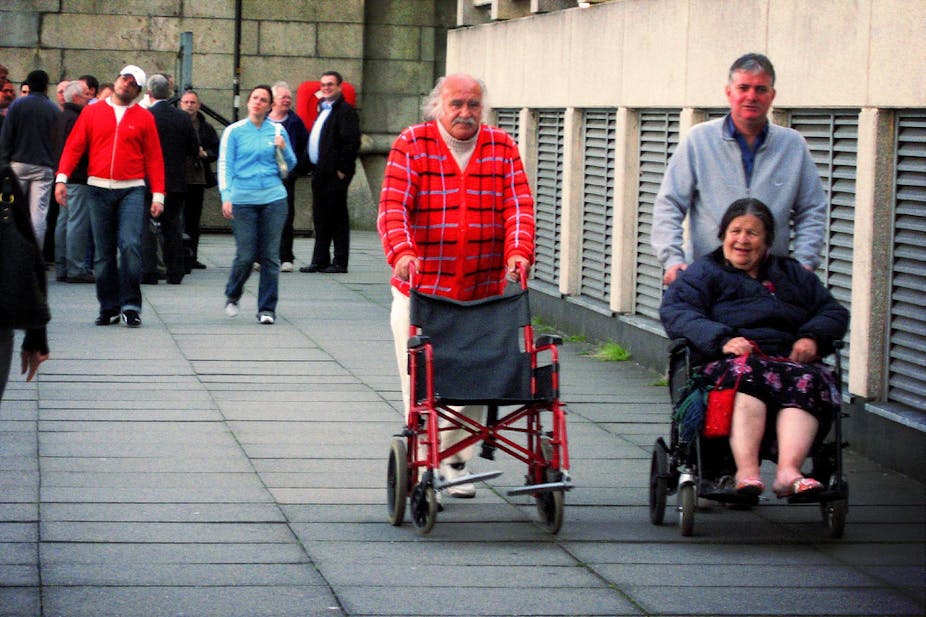Given conventional ideas of male roles, we often tend to imagine carers as being women. But more men take on this “unpaid work” than you might think, and particularly in older groups. Research we’ve carried out shows just how difficult some find it.
Around 6m men and women in England and Wales provide care for ill or disabled relatives according to 2013 figures from the Office for National Statistics. Men play a significant part in this. While more women than men under 65 are carers, men aged in the 50-64 age group provide a higher percentage of unpaid care than women aged 25-49. Among the over 65s, more men provide care (15%) than women (13%).
But because older men often believe it is their role to look after their families and cope with changing circumstances, older men who care for spouses, partners or family can become isolated and unwilling to ask for help, or even ignored by GPs who focus on the person needing care.
Don’t call me carer
In addition to the everyday challenges of caring, cleaning, bathing and tending to someone who relies on you for help, men can also struggle with the idea of what this means for their masculinity.
For example, in a series of written accounts we’ve gathered from older carers and care professionals at the Centre for Ageing Research at Lancaster, we found that some men didn’t like being called carers for this reason. And the impact the role had on the men’s sense of themselves was tangible both in physical and psychological terms.
In terms of physical health, we heard reports of back problems, sleep disturbance, and a worsening of their own long-term health conditions. Mental health issues included stress, anxiety, fatigue and fear, and there were reports of decline in fitness levels – through having to give up sports, being unable to leave the house, and confined to a slower pace of life – as well as less social activities and the financial implications of giving up paid employment and paying additional care costs.
From the general to the very individual, these older male carers experienced loss in many areas of their lives and experiences: in no longer being able to enjoy joint pleasurable interests; sexual intimacy; “normal” conversations; family worries or traumas; or the grounding perspective arguments brought to mutual engagement in a relationship. This sense of loss affected their futures, plans, relationships and friends.
It could be argued that similar challenges are faced by female carers – but the problem for men is the lack of support networks, and a reluctance to discuss these problems.
Getting help
Overall, older men are less likely and less forthcoming generally in asking for help and support than older female carers; they tend to reach crisis point before asking for support from care services.
So family support, for example, isn’t necessarily something that older male carers feel they can rely on. Some in our research suggested that while it was appreciated, family could not give anything other than “arm’s length” emotional support. Friends were sometimes described as “well meaning” but too far away. Similarly neighbours might keep a “watchful eye”, but as one older male carer said, he could only call on them in a “real emergency”.
On the whole, older male carers said they found it difficult to develop new social networks that fit with their caring role and found carers’ support groups or other local community groups to be dominated by women with different interests. In terms of their experiences of statutory health and social care support services, they often found these too focused on a formal process of assessing domestic roles.
By and large, gender is not considered critical to care-giver research so the experience of men (or women) in particular often goes unquestioned. In a review of male care-giving for people with dementia, the authors noted that while research on this topic is limited, the studies that do exist indicate that men experience care-giving differently from women. For example, studies that used surveys or interviews tended to report highly stereotyped emotions like men talking about pride with women talking about affection – a difference that was less evident in more observational or diary-based studies.
This suggests that male carers – older and perhaps younger – can have a different kind of experience and need different kinds of support than older women carers. They can carry the personal and social losses they encounter alone, through their tendency not to engage in emotionally sensitive conversations.
Caring is already estimated to save the economy some £119 billion a year. And if the number of people with dementia is set to double in the next 30 years, that alone will drive even more demand for this kind of informal care.
When we think about care services and supporting care, we need to think through whether some services may benefit from, or be improved by, a greater acknowledgement of gender. It’s important because this very issue is at the centre of a larger one about who will be taking on caring roles as we age and live longer, and the impact on health services if fewer people either want to take on the job, or feel capable of doing it.

